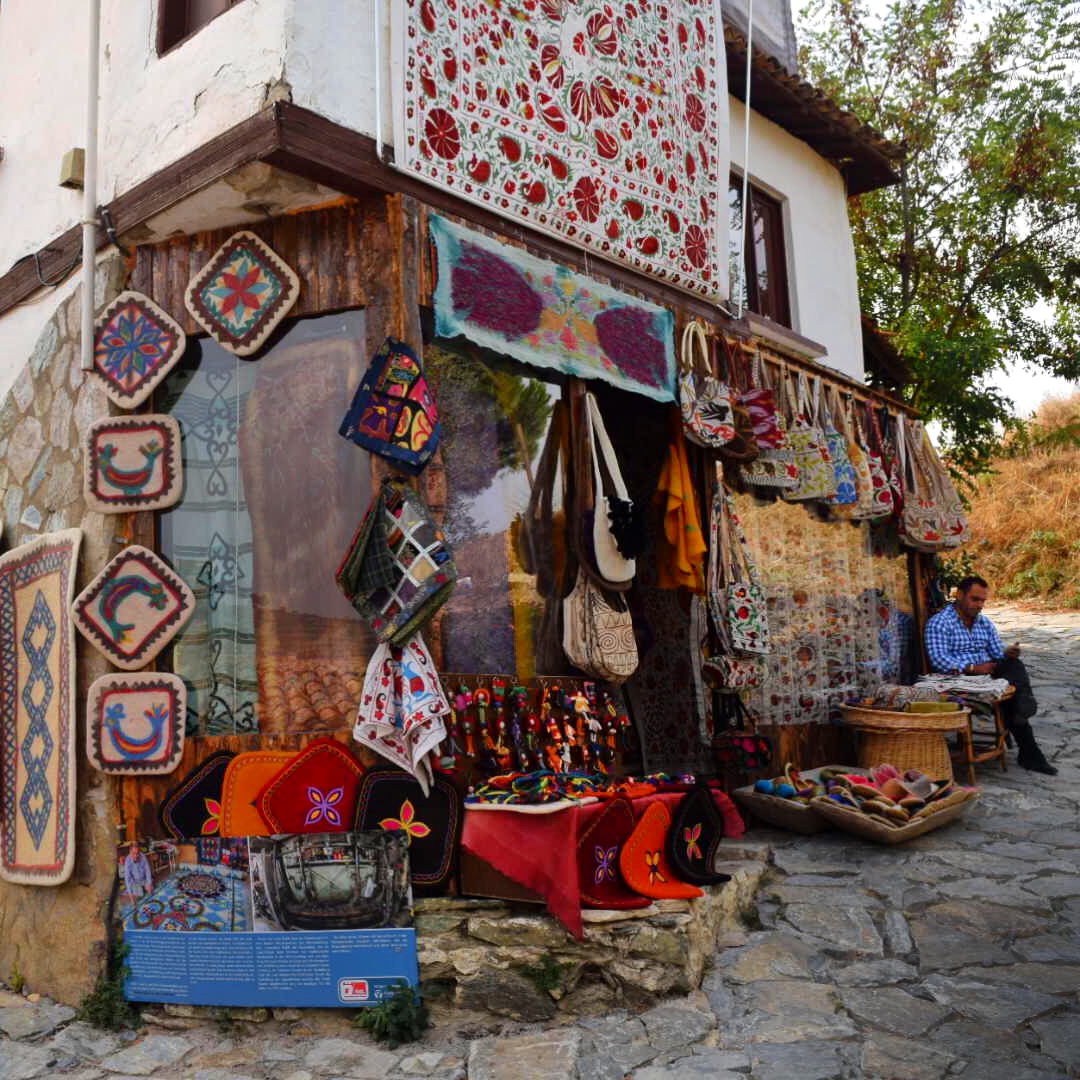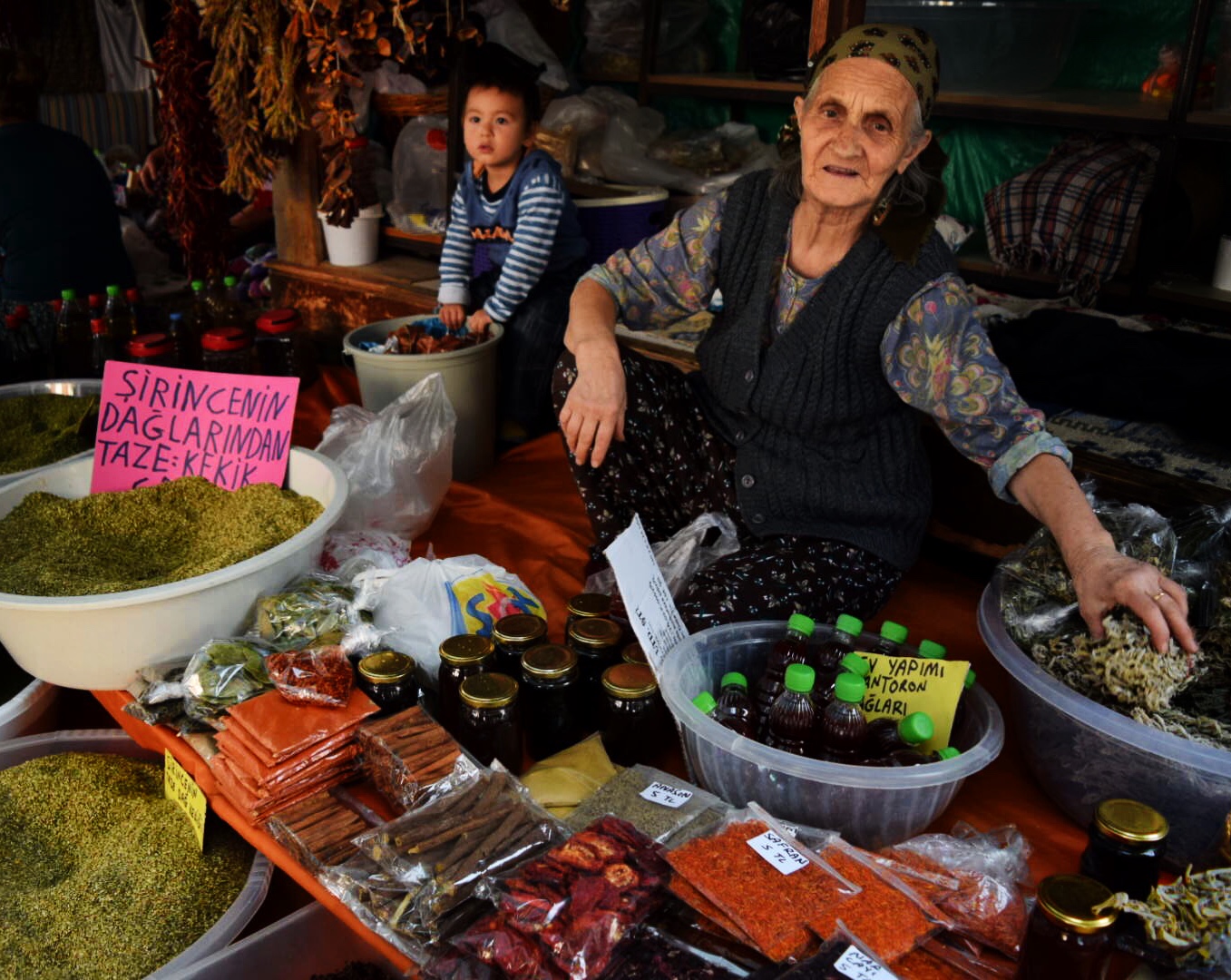PLACES + THINGS: Getting Lost, Urfa Turkey.
On the long drive from Cappadocia to Adıiyaman, I stared stubbornly out of the car window—I didn’t want to miss any detail. I watched for hours as the scene changed: frame after frame, like a film. Pomegranate trees bright with fruit, low-growing tobacco plants waving along roadsides, backyards hung with colorful rugs and ancient cemeteries on rolling hills topped with white marble beds. All fleeting glimpses of lives equally foreign and familiar to me.
We drove on highways that sliced through mountainsides, creating colourful cross sections of rock. Silvery sage blended into pale mauve and pigments of rust or mustard fell into deep emerald, like massive stone rainbows. Dusty-coloured mountain ranges drifted through my window frame, smoothed and muted by distance, and the brilliant blue sky grew pale where the two met, its color dissolving into the jagged horizon. I was stunned. I was seeing Turkey.
Turkey had been a place that I had longed to see for over a decade. In my twenties I had imagined it to be a deep and textured land to be lost in, and over the years, my imagination layered fantasies one on top of the other until my desire for Turkey was so thick, I went.
It began at my hotel in Bodrum, where after spending some time on the Mediterranean shore, I waited, anticipating a simple car transfer so that I could go deep into the country. Instead, I was met by two men hired to escort me. At that time, I was so accustomed to traveling by myself, wandering the world had become a form of meditation. I had been feeling strangely lost, and found that the silence of exploring alone created space to see with new light, so my unexpected companions unnerved me, but I greeted them politely and we started on our way.
After hours of driving the parched highways, civilization began to sprinkle the landscape. We rolled into a truck stop to stretch our legs and my guide gestured toward the meager patio. It was nearly empty, save for a few men looking questioningly at us, it was clear that they rarely encountered tourists here. We sat at one of the plastic, picnic-style tables and ordered a breakfast of salty black olives, fresh juicy tomatoes, crisp cucumbers, honeycomb and a thick milk cream to spread on bread. We finished, as with every meal, with tea.
“We are lost. I’m sorry,” said the guide.
“What do you mean we are lost?”
“The driver went on the wrong highway and we are going in the opposite direction.”
I could see strain in his face and was curious to observe the privacy of his disorientation. So I said, as nonchalantly as I knew how, “I wouldn’t know either way. I’m thankful for the drive.” And I was, it wasn’t what we had planned, but I was comfortable with being lost.
After the long detour, we arrived at our hotel just after dusk. The room was sparse and abstinent, in a Kurdish part of Southeast Turkey. It wasn’t a city tourists usually visited, but I had come in search of Mount Nemrut. I had read of this tomb atop a volcano, strewn with the giant decapitated heads of granite gods, best seen at dawn. I as searching to satisfy a curiosity. Would it be as eerie as I had imagined it? Will the sun rise differently, shed in different place? Would I see with new light too?
After a dinner of kebabs and kanefeh, I awoke in the dead of night, pulled on my boots for a hike in the dark, lit only by moonlight. I marched in silence until I reached the summit where I sat and waited for the sun to peak over the horizon. I watched the sky slowly brighten from black to indigo until I saw golden light emerge like a halo. Just before dawn, I stood facing the sun, closed my eyes, breathed in the cold, flickering wind and listened for the call to prayer. After weeks in Turkey I had begun to long for the haunting, melodic chant, marking the milestones in a day, reminders to pause and be grateful, reminders to end and begin each day with a prayer.
As sunlight began to spread over my face, I opened my eyes to see the faces of the fallen statues, shadows in their sunken eyes. The prayer carried itself for miles over the surrounding valleys, rising up to me like an exhale, and I gave thanks.
Afterward, during a bland hotel breakfast, feeling warm and satiated, I changed my mind about where I wanted to go next. Our plan was to fly north to see a monastery carved into a cliff, but for some reason I said no. Instead we drove to Urfa, a city close to the Syrian border, so foreign to tourists that there were no souvenirs or evil eye key chains, only men’s prayer beads and cigarette kiosks lined with bags of local tobacco. I was mesmerized by its honesty—no spectacle or show, just a city in its everyday rhythm.
We entered a labyrinth of narrow streets bustling with men wearing throbes, the light piercing between the shaded buildings. My guide explained that most women were busy with household duties at this time of day, so I was the only one. We wove through a tapestry of markets and courtyards that had been ancient caravan stops on the spice route, pausing to observe the unfiltered culture of a city.
We walked through old wooden doors and into an open-air square filled with tea shops and vendors. Young boys sold simit, rings of sesame seed–crusted bread that they carried on long rods or on wagons. Groups of men passed their time playing chess, and those not playing watched the game like a sporting event. We wandered, taking in the smells of isot, sumak and roasting coffee, tasting pistachios freshly picked from local trees. I listened to ancient stories of a place so ancient, that the impossible became believable.
After I’d had a lunch full of red hot spices and halva, my guide asked me to follow him down a small, dark side street lined with stalls. One was melting copper, the next was hammering sheets into pots so beautiful the French would swoon. The following stall was in charge of tinning the interior, and so it went, a community within itself. By leading me here he hoped to impart his passion for old craftsmen, to show me a Turkey far from the grand bazaars with imitation handbags.
Along the entire way, locals stopped to offer me tea and a home cooked meal. I learned that in Islamic culture, visitors are seen as blessings from God. Each person I met had led by the hand into the privacy of a culture to which I didn’t belong. And though I was surrounded by guides, precisely because I was not alone, I was able to see this place in a different light – losing myself in a place that could not have been otherwise found.
*This article was adapted from a piece I had written in 2014 for Hayo Magazine.







